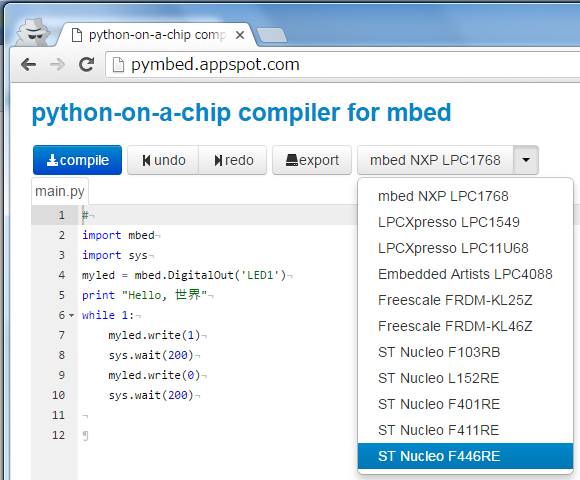python-on-a-chip online compiler
- http://pymbed.appspot.com/
- https://code.google.com/p/python-on-a-chip/
- http://www.youtube.com/watch?v=Oyqc2bFRW9I
- https://bitbucket.org/va009039/pymbed/
more info: python-on-a-chip
vm/int.c
- Committer:
- va009039
- Date:
- 2016-04-14
- Revision:
- 15:94ca5c8003e5
- Parent:
- 0:65f1469d6bfb
File content as of revision 15:94ca5c8003e5:
/*
# This file is Copyright 2002 Dean Hall.
# This file is part of the PyMite VM.
# This file is licensed under the MIT License.
# See the LICENSE file for details.
*/
#undef __FILE_ID__
#define __FILE_ID__ 0x08
/**
* \file
* \brief Integer Object Type
*
* Integer object type operations.
*/
#include <limits.h>
#include "pm.h"
PmReturn_t
int_dup(pPmObj_t pint, pPmObj_t *r_pint)
{
PmReturn_t retval = PM_RET_OK;
/* Allocate new int */
retval = heap_getChunk(sizeof(PmInt_t), (uint8_t **)r_pint);
PM_RETURN_IF_ERROR(retval);
/* Copy value */
OBJ_SET_TYPE(*r_pint, OBJ_TYPE_INT);
((pPmInt_t)*r_pint)->val = ((pPmInt_t)pint)->val;
return retval;
}
PmReturn_t
int_new(int32_t n, pPmObj_t *r_pint)
{
PmReturn_t retval = PM_RET_OK;
/* If n is 0,1,-1, return static int objects from global struct */
if (n == 0)
{
*r_pint = PM_ZERO;
return PM_RET_OK;
}
if (n == 1)
{
*r_pint = PM_ONE;
return PM_RET_OK;
}
if (n == -1)
{
*r_pint = PM_NEGONE;
return PM_RET_OK;
}
/* Else create and return new int obj */
retval = heap_getChunk(sizeof(PmInt_t), (uint8_t **)r_pint);
PM_RETURN_IF_ERROR(retval);
OBJ_SET_TYPE(*r_pint, OBJ_TYPE_INT);
((pPmInt_t)*r_pint)->val = n;
return retval;
}
PmReturn_t
int_positive(pPmObj_t pobj, pPmObj_t *r_pint)
{
PmReturn_t retval;
/* Raise TypeError if obj is not an int */
if (OBJ_GET_TYPE(pobj) != OBJ_TYPE_INT)
{
PM_RAISE(retval, PM_RET_EX_TYPE);
return retval;
}
/* Create new int obj */
return int_new(((pPmInt_t)pobj)->val, r_pint);
}
PmReturn_t
int_negative(pPmObj_t pobj, pPmObj_t *r_pint)
{
PmReturn_t retval;
/* Raise TypeError if obj is not an int */
if (OBJ_GET_TYPE(pobj) != OBJ_TYPE_INT)
{
PM_RAISE(retval, PM_RET_EX_TYPE);
return retval;
}
/* Create new int obj */
return int_new(-((pPmInt_t)pobj)->val, r_pint);
}
PmReturn_t
int_bitInvert(pPmObj_t pobj, pPmObj_t *r_pint)
{
PmReturn_t retval;
/* Raise TypeError if obj is not an int */
if (OBJ_GET_TYPE(pobj) != OBJ_TYPE_INT)
{
PM_RAISE(retval, PM_RET_EX_TYPE);
return retval;
}
/* Create new int obj */
return int_new(~((pPmInt_t)pobj)->val, r_pint);
}
PmReturn_t
int_print(pPmObj_t pint)
{
PmReturn_t retval = PM_RET_OK;
uint8_t buf[12];
C_ASSERT(pint != C_NULL);
/* Raise TypeError if obj is not an int */
if (OBJ_GET_TYPE(pint) != OBJ_TYPE_INT)
{
PM_RAISE(retval, PM_RET_EX_TYPE);
return retval;
}
retval = sli_ltoa10(((pPmInt_t)pint)->val, buf, sizeof(buf));
PM_RETURN_IF_ERROR(retval);
sli_puts(buf);
return retval;
}
PmReturn_t
int_printHex(pPmObj_t pint)
{
uint8_t buf[9];
PmReturn_t retval = PM_RET_OK;
C_ASSERT(OBJ_GET_TYPE(pint) == OBJ_TYPE_INT);
/* Print the integer object */
retval = sli_ltoa16(((pPmInt_t)pint)->val, buf, sizeof(buf), 1);
sli_puts(buf);
return retval;
}
PmReturn_t
int_pow(pPmObj_t px, pPmObj_t py, pPmObj_t *r_pn)
{
int32_t x;
int32_t y;
int32_t n;
PmReturn_t retval;
/* Raise TypeError if args aren't ints */
if ((OBJ_GET_TYPE(px) != OBJ_TYPE_INT)
|| (OBJ_GET_TYPE(py) != OBJ_TYPE_INT))
{
PM_RAISE(retval, PM_RET_EX_TYPE);
return retval;
}
x = ((pPmInt_t)px)->val;
y = ((pPmInt_t)py)->val;
/* Raise Value error if exponent is negative */
if (y < 0)
{
PM_RAISE(retval, PM_RET_EX_VAL);
return retval;
}
/* Calculate x raised to y */
n = 1;
while (y > 0)
{
n = n * x;
y--;
}
retval = int_new(n, r_pn);
return retval;
}
PmReturn_t
int_divmod(pPmObj_t px, pPmObj_t py, uint8_t op, pPmObj_t *r_pxopy)
{
int32_t x;
int32_t y;
int32_t xdivy;
int32_t xmody;
int32_t xopy;
PmReturn_t retval = PM_RET_OK;
/* Raise TypeError if args aren't ints */
if ((OBJ_GET_TYPE(px) != OBJ_TYPE_INT)
|| (OBJ_GET_TYPE(py) != OBJ_TYPE_INT))
{
PM_RAISE(retval, PM_RET_EX_TYPE);
return retval;
}
x = ((pPmInt_t)px)->val;
y = ((pPmInt_t)py)->val;
/* Raise ZeroDivisionError if denominator is zero */
if (y == 0)
{
PM_RAISE(retval, PM_RET_EX_ZDIV);
return retval;
}
/* Issue #167: Make overflow silent until exceptions can be caught */
/* (-sys.maxint-1)/-1 is the only overflow case. */
/* TODO: enable the overflow for Issue #169 */
/*
if ((y == -1) && (op == '/') && (x < 0)
&& ((uint32_t)x == (0 - (uint32_t)x)))
{
PM_RAISE(retval, PM_RET_EX_OFLOW);
return retval;
}
*/
/* Shortcut when denominator is one or negative one */
if (y == 1)
{
xdivy = x;
xmody = 0;
}
else if (y == -1)
{
xdivy = -x;
xmody = 0;
}
else
{
xdivy = x / y;
xmody = x - xdivy * y;
/*
* If the remainder is non-0 and the signs of x and y differ,
* C89 doesn't define whether xdivy is now the floor or the
* ceiling of the infinitely precise quotient. We want the floor,
* and we have it iff the remainder's sign matches y's.
*/
if ((xmody != 0) && ((y ^ xmody) < 0))
{
xmody += y;
--xdivy;
C_ASSERT(xmody && ((y ^ xmody) >= 0));
}
}
xopy = (op == '/') ? xdivy : xmody;
return int_new(xopy, r_pxopy);
}
